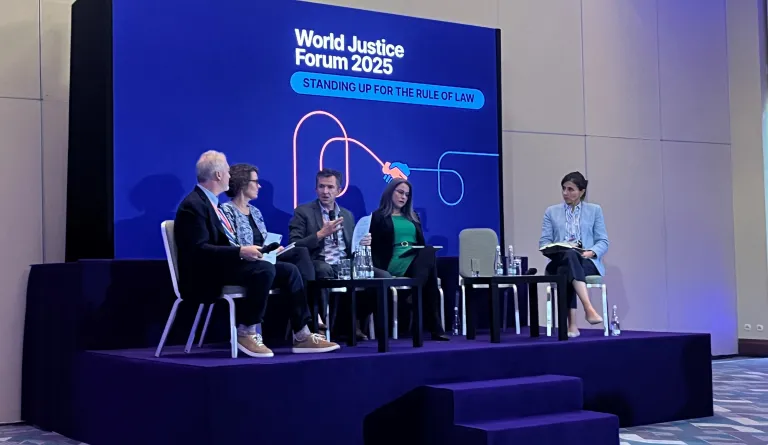Global Voices for Justice: Takeaways from the World Justice Forum 2025

In the last month I had the privilege of attending the World Justice Forum 2025: “Standing Up for the Rule of Law” in Warsaw, Poland. The Forum was a gathering of global leaders, jurists, and human rights champions who came together to confront the rising tide of authoritarianism and reverse the global rule of law recession. In a city with its own deep history in the struggle for freedom, it was a sobering gathering, but it also provided a powerful space to share lessons learned and chart a path forward of hope and action.
The Forum opened with remarks from Poland’s former Minister of Justice Adam Bodnar, who spoke of the challenges in Poland and the lessons learned. Bodnar shared the pressures on attorneys and judges and the attacks on judicial independence in Poland, as well as the process of rule of law recovery. He highlighted the critical role of civil society in upholding the rule of law, as well as the importance of those working at the local level to ensure that the law serves the people.
"We meet in Warsaw because here in Poland, for eight years, we have been suffering from a rule of law crisis. We are suffering the illiberal trend—a lot of Polish judges, prosecutors, and attorneys have been subject to intimidation and undue pressure… We are doing our best to recover from this rule of law crisis,” said Bodnar.
The cooperation and support of the global community has been critical in Poland. Bodnar spoke of the “1,000 Robes March” in 2020, a silent protest in Warsaw involving judges and other legal professionals from across Europe who united in protest to proposed legislation intended to undermine the independence of the judiciary. He highlighted the critical role that everyone plays in civic education, including civil organizations, judges, and lawyers. Bodnar emphasized that the focus must not be just on the bedrock principles of judicial independence, but also on the effectiveness of our justice system.
While Poland was a fitting location for the Forum, these challenges extend around the world. According to the World Justice Project’s Rule of Law Index, over half of the countries studied experienced a decline in the last year, and 78% of countries have seen rule of law deterioration over the past six years. Focusing on 2024 and factors that lead to the rule of law recession, 57% of countries saw a decline in constraints on government powers, 63% saw a decline in fundamental rights, and 56% experienced a decline in civil justice.
Public trust in institutions is struggling around the world, where there is a feeling that democracy isn’t delivering for the people. The list of struggling democracies now includes the United States, which has experienced an overall decline in the rule of law since 2016, dropping to 26 of 142 countries in 2024.
The 2024 OECD Survey on Drivers of Trust in Public Institutions reports that only 39% of people trust their national government, only 37% are confident that their government balances the interests of current and future generations, and only 41% believe their government uses the best available evidence when making a decision.
Amidst these sobering accounts and data, the Forum provided clarity regarding what is needed to chart a path forward and bolster the rule of law:
Embrace the role of collaboration
The Forum was a powerful gathering of people from around the world who are committed to the rule of law, people-centered justice, and evidence-based reform. It was a reminder of the commonalities that tie us together and the importance of a global commitment to meeting people’s justice needs.
Recognize that communication is more important than ever
People don’t understand our justice system, the rule of law, or how courts work. We all need to up our communications game. This is true for courts and for all actors in this space. Communications strategies must be learned and invested in. We can’t let others define us. We must contribute to the discourse regarding the rule of law and connect these efforts directly to the basic issues that are of real concern to people every day.
Focus on people-centered, data-driven justice system innovation
We need to focus on putting people at the center of the justice system and use data and evidence to support this work. It is vital that the rule of law be practiced daily, and that people feel they can get just resolution to the justice problems in their lives. Those without access are the first to suffer and the last to recover. The persistent gap in access sends a message that justice is not meant for all. We must focus on closing the justice gap, which requires innovation, expertise, best practices, tools, and investment.
Work locally
While there is an increased tendency to shut down when there are threats to the rule of law, it is more important than ever to work toward change. The Forum highlighted that the local work being done in this area is very effective. Energy and hope come from these efforts, as does real impact for people in their experience with the justice system.
Drive home the business case for the rule of law
It is critical to build the business case for access to justice. Businesses need predictability, particularly small businesses, and they need a robust justice system that meets these promises. A functioning justice system is a strategic economic imperative.
We are not alone. It is a sobering takeaway, but also a source of hope. While the United States is faced with its own rule of law crisis, we can look to others around the world for lessons learned and a path forward. The Forum ended with the release of a set of Warsaw Principles, which represent “a unified front against rising authoritarian pressures and a framework for collective action to strengthen accountability,” as well as a series of speakers highlighting the work to be done.
The 10 Warsaw Principles call for:
- Safeguarding institutional checks and balances
- Ensuring peaceful transfers of power
- Protecting civic space and fundamental rights
- Strengthening judicial independence
- Eliminating corruption
- Advancing people-centered justice
- Securing lawyers’ safety
- Integrating the rule of law in sustainability, technology, and development
- Fostering integrity in business environments
- Enabling cross-sector partnerships
"One of the most pressing challenges to accountability, governance, and the rule of law is the deepening crises of trust,” said Jan Beagle, Director-General of the International Development Law Organization. “We know that the rule of law is the immune system of democracy. We see the Warsaw principles as a timely and much needed articulation of what we must do. Our shared challenge is to turn these principles into tangible improvements in people's lives and convince them that the rule of law is not an abstraction; it's worth believing in and fighting for.”
The work I’ve highlighted above affirms what drives us at IAALS: a bold vision of a justice system that works for everyone. We embrace this challenge and continue this work with conviction, a common purpose, a commitment to people-centered justice, an infusion of energy to sustain efforts, and hope for the future.
